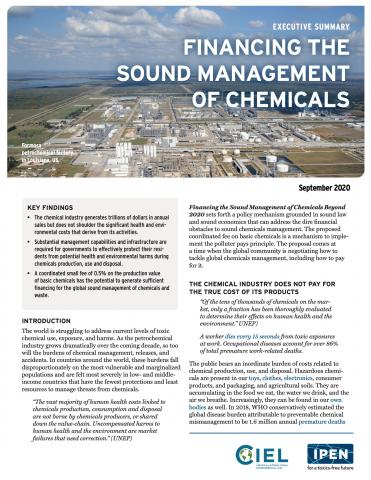International Coordinated Fee on Basic Chemicals
For Immediate Release
September 15, 2020 GMT +2
Attn: Environment and Global Health News
Contacts:
Cate Bonacini, CIEL, cbonacini@ciel.org
Laura Vyda, IPEN, lauravyda@ipen.org
Paying for the Damage: A Tax on Chemicals to Hold Producers Financially Accountable
(Gothenburg, Sweden) As people and ecosystems around the world are increasingly exposed to multiple and interacting hazardous chemicals, experts from leading international law and global chemical safety organizations are releasing a groundbreaking report that offers a clear pathway to finance the control and regulate toxic chemicals and waste: a producer-pays tax on basic chemicals.
The chemical industry generates trillions of dollars in annual sales (projecting sales over USD 11 trillion in 2030), but it does not bear the significant health and environmental costs that derive from its activities. These costs, according to World Health Organization estimates, include 1.6 million annual premature deaths due to the global disease burden attributable to preventable chemical mismanagement and 45 million Disability-Adjusted Life Years (DALYs).
The proposal by the Center for International Environmental Law (CIEL) and the International Pollutants Elimination Network (IPEN) asserts that chemical producers must take greater financial responsibility for the safe management of their products, beginning with the production of feedstock chemicals that fuel the global chemicals sector and the rapidly growing petrochemical industry.
The plan proposes a small coordinated fee of 0.5% on the production value of basic chemicals that will fund the sound management of chemicals and waste. Basic chemicals are early-stage chemicals produced from petroleum, natural gas, and other raw materials. These chemicals represent the basic building blocks from which all other chemicals are made. In 2018, sales of basic chemicals totaled USD 2.3 trillion.
Executive Summary: Financing the Sound Management of Chemicals
Four-page summary of Financing the Sound Management of Chemicals Beyond 2020: Options for a Coordinated Tax
FAQ: Financing the Sound Management of Chemicals
Answers to common questions about the international tax or fee on basic chemicals.
Video: Financing the Sound Management of Chemicals
17-minute video discussion of the international tax or fee on basic chemicals. (Voice-over is English; subtitles are in languages indicated.)
Such a fee places the financial responsibility for chemicals and waste management where it belongs: on the industries profiting from the production of those chemicals. The fee would be collected by the country where the company producing basic chemicals is registered and be paid to a global fund.
The tax would generate approximately eighty-five times the total annual assistance currently flowing to global chemicals management and has the potential to generate sufficient financing for the global sound management of chemicals and waste. Based on 2018 figures, a 0.5% tax on the production value of basic chemicals could raise USD 11.5 billion annually. These funds would support regulatory capacity, infrastructure, information and monitoring systems, and waste management and cleanup systems.
This plan assists countries to implement the polluter pays principle and provides a level playing field for the industry. Further benefits of the plan include that it would use existing domestic regulatory infrastructure to collect the taxes or fees while avoiding the challenges of delegating taxation authority to an international body. It is also in accordance with World Trade Organization law and would not affect consumer pricing.
“Exposure to hazardous substances has become so common that people hardly even register the thousands of toxic chemicals in their daily lives, yet toxic chemical exposure is one of the biggest human rights and environmental issues of our time,” says Nathaniel Eisen, Legal Fellow at CIEL. “This plan sets forth a simple, easily implementable system of producer responsibility to address this crisis and to meaningfully protect people and ecosystems from the impacts of toxic chemical exposure. For governments and companies alike, this plan should be a no-brainer.”
"Our proposal operationalizes government agreement that the costs of chemical production, use and disposal should be shifted from governments to the private sector," said Joe DiGangi, Senior Science Advisor at IPEN. "If the chemical industry is responsible, it should welcome the opportunity to financially contribute a small 0.5% fee to help governments manage the industry's products."
###




